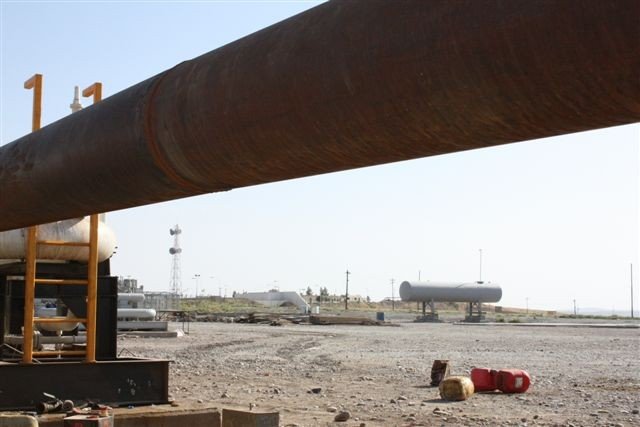1 of 5 | DNO's oil pipeline ends here at Faysh Khabur, near the Iraq border with Turkey and Syria. It's less than a half mile from the Iraqi government's oil metering station, seen in the background, but a deal hasn't been reached between Baghdad and the Kurdistan Regional Government to allow exports from KRG-inked deals. (Ben Lando/UPI)
FAYSH KHABUR, Iraq, June 13 (UPI) -- The pipeline that could pump northern Iraqi oil for export is nearly complete but empty, ending for now in the soil near the borders with Syria and Turkey, on the side of a dirt road.
Across the dirt road are the buried pipelines that carry oil from Iraq's second-largest oil hub, Kirkuk, to the Iraqi government's oil export metering station guarded by Iraqi Kurdish forces less than a half mile up the dirt road, and on to the Turkish port of Ceyhan.
Norwegian company DNO's oil and the idled pipeline await the outcome of ongoing negotiations between the Kurdistan Regional Government and the federal Iraqi government to give it permission to export.
Both sides' oil officials say they are ready to sign an export deal, but there has been no agreement yet. If one is reached, it could add 1 million barrels per day to the market within five years -- half of Iraq's total exports now -- according to KRG estimates.
"We have told the KRG that we are willing to receive all the oil that's being produced by DNO and others," said Iraqi Oil Minister Hussain al-Shahristani, adding the "others" include only the four contracts signed before February 2007 when a draft oil law was agreed to by both sides. Oil produced by the more than a dozen other contracts signed since then would be confiscated outright, he said, claiming Baghdad's sole rights to sign deals.
"We told them OK, we'll send a technical team to hook up their pipeline to our export pipeline, and nothing has happened," he told UPI in an interview at his office in Baghdad. "We never had an issue with the fact that any oil produced in any part of the country is the property of Iraq."
He said all Iraqi oil exports must take place by Iraq's State Oil Marketing Organization and all the revenue deposited into the Development Fund for Iraq, the U.N. mandated and audited account of Iraqi oil sales.
"That has always been our position. We not only encouraged that but insist that there is no other way to export oil but through our export pipelines and SOMO contracts."
Ashti Hawrami, the natural resources minister of the KRG, said there are still a few issues on the technical side to be resolved before the KRG will be able to actually export.
"When we are ready, we will call our colleagues, and I don't envisage any problem in that," he said. "The metering station is in the KRG territory. We can just link up the pipeline, open the metering and tell SOMO that so many barrels are going through, please account for it.
"All we are doing is expanding Iraq's production capacity," said Hawrami, speaking to UPI in his Erbil office. "So what's wrong with that?"
The export issue has been included in disputes between the central and regional governments over revenue sharing, the legitimacy of the KRG deals and the oil law.
Both sides say the constitution backs them, and both insist they are doing what's best for Iraq as a whole. But the structure of control and decision-making over the oil sector spread throughout the country hasn't been finalized. And there is still widespread opposition to such industry-friendly deals, such as production-sharing contracts the KRG has signed ("The government takes about 90 percent or so," Hawrami said), let alone the role international oil companies should play in Iraq's oil future.
Talks are expected to resume next week, over this and more fiery impasses, such as a new federal oil law and the more than a dozen other contracts the KRG signed with international oil companies.
DNO's project to find and produce oil is by far the most advanced of them all. A 45-minute drive from the end of the empty pipeline is the village of Tawke, where a pool of seepage oil bubbles. Nearby is DNO's main KRG site, where a handful of wells produce oil and either fill up tankers there or at the central processing facility.
Tawke has produced a 6,000 to 7,000 barrel per day average since June 2007, said Magne Normann, DNO managing director of the Iraqi Kurdistan work.
"We are not in a position to give any guidance to this, but we hope that we are commencing export by the end of this year," he said. "The design capacity of our facilities is 50,000 bpd, which can be delivered once export is in place. In the meantime we are delivering oil to the domestic market by tanker trucking."
About 10,000 bpd of KRG-produced oil is sold currently, all to the domestic market, Hawrami said. He denies reports that oil exports via tanker have headed into Iran.
He said most of the new production from within the KRG boundaries will be sent to foreign markets.
"Maybe some of it will be used to feed a few local refineries to satisfy the local consumption," he said. There are plans for about 100,000 bpd worth of refineries in the region.
But within five years, Hawrami said, the KRG oil sector will be more robust.
"From the contracts we've signed, and those under negotiations, and the contracts that may be signed in a year, 18 months down the line," Hawrami said, "cumulatively out of these activities we believe we'll get a stable million barrels a day for many years."
--
(e-mail: [email protected])















